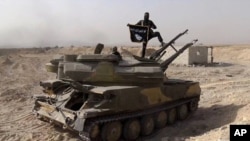Islamic State extremists are intensifying an offensive on a group of towns and villages at the heart of a buffer zone U.S. and Turkish authorities say they want to establish in northern Syria. The offensive complicates the challenge of securing the buffer zone from ground attacks by Islamic militants, but also adds to the urgency of setting it up, say analysts.
Fierce fighting erupted Tuesday between Syrian rebel factions and Islamic extremists in the town of Marea, 25 kilometers north of Aleppo, one of the town’s in the buffer zone Washington and Ankara want to sweep free of the so-called Islamic State.
At least 20 rebel fighters from a militia aligned to the Western-backed Free Syrian Army were killed in Marea when four Islamic militants killed themselves by detonating suicide belts, according to a monitoring group.
In the past few days Islamic State forces have attacked several villages inside the proposed buffer zone, including Asenbol, al-Eion, and Hor al-Naher, in a bid to cut off Syrian rebel factions from supply lines into Turkey.
“Clashes took place between rebel and Islamist factions and a group of fighters who it is not known whether they were members of Islamic State sleeper cells or whether they were able to break into Mare’ city,” said Rami Abdulrahman of the British-based Syrian Observatory for Human Rights, which relies on local activists for information.
After prolonged skirmishing Sunday, and amid the thundering booms of U.S.-led coalition airstrikes, IS extremists captured the village of Ma'arat Umm Hawsh, according to the Syrian Observatory. More than 30 rebels died in the assault.
The renewed fighting comes a day after al-Qaida affiliate Jabhat al-Nusra, an IS rival, announced it was withdrawing its forces from the area to the north of Aleppo. The group said it was doing so in protest of the buffer zone plan.
Some rebel commanders fear al-Nusra’s withdrawal may weaken anti-IS forces in the area, especially if their allied Islamist militias are not involved in the defense of the buffer zone. “Al-Nusra is the strongest of the groups fighting Daesh,” said a moderate rebel commander using an Arabic acronym for IS, “Without them we may not be strong enough to withstand Daesh, without some of their (al-Nusra) allies we certainly wouldn’t be able to."
But some analysts argue al-Nusra is surreptitiously helping Ankara by withdrawing, because that would assist Turkey in trying to persuade the United States to work with a wider array of anti-Assad insurgents to guarantee the zone’s security.
U.S. and Turkish officials concede there is no agreement between them about which rebel militias they are prepared to collaborate with in the zone. Ankara wants to include Islamist militias that Washington has shunned in the past, including Ahrar al-Sham, a close ally of al-Nusra, whose commanders say they are prepared to defend a safe zone.
“The viability of any such zone, whether ‘safe’ or ‘ISIL-free,’ depends on the capacity of the ground forces in place,” said Charles Lister, a Mideast analyst with the Brookings Doha Center, a think tank.
He argued Ankara appeared to be shaping the circumstances whereby a buffer zone relied on Islamist militias for ground protection. “Turkey seems to be pushing the U.S. into a corner right now, leaving powerful groups in the prospective zone and presenting what it sees as the most effective ground force to produce and defend a ‘safe’ or ‘ISIL-free’ zone.”
Turkey has long argued for a buffer zone, but the Obama administration has resisted, fearing it would be drawn further into the four-year-long Syrian civil war.
The two countries agreed last month on a prospective IS-free zone along border. Ankara also agreed U.S. warplanes could use the NATO base at Incirlik in southern Turkey for bombing missions against the Islamic extremists,
Half-a-dozen U.S. F-16 fighter jets arrived Sunday at Incirlik and Turkey's foreign minister said an “extensive” fight against the extremists would soon commence in earnest.
A State Department official told VOA “Turkey has granted the United States expanded access to Turkish facilities to enhance air operations against ISIL. Beyond air operations, we continue our dialogue with Turkey to evaluate options on the most effective means of countering ISIL on its borders in a manner that promotes Turkey’s security and regional stability.”




